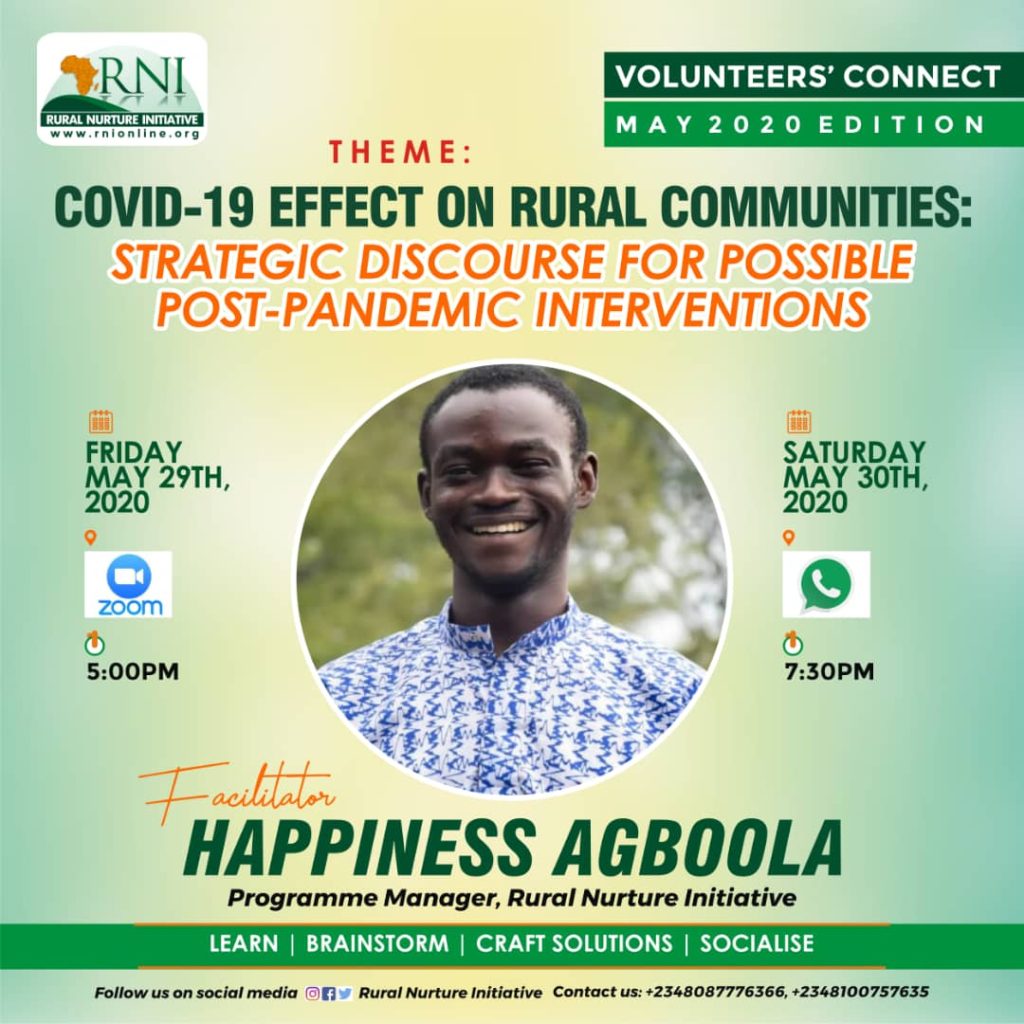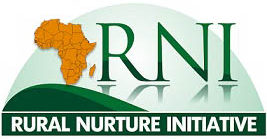
May edition of Volunteers’ Connect, themed COVID-19 LOCKDOWN: Possible Implications for Rural Communities, hosted Happiness Agboola, RNI’s Programme Manager as facilitator.
The webinar commenced with a welcome address by the Executive Director, Damilola Iyiola, after which the facilitator had the floor.
Mr. Happiness took the floor by asking the audience a few thought provoking questions:
- Are urban settlements ready for a technology driven education system let alone rural communities? This is what the post-COVID era demands but with the exorbitant price of data and the eclectic power supply in Nigeria, is this feasible?
- Does investing in a technology-based education system equate more debt for Nigeria’s future generation and what are the chances of the rural communities being carried along with the proposed development?
He further mentioned that palliatives only became a popular topic of public knowledge earlier in 2020 in the wake of the gruelling effect of COVID 19. However, it is listed on the United Nation’s website that the sum of five thousand naira is being given to the poor and vulnerable in Nigeria for the 4th year running.
Mr Happiness went further to explain that Nigeria had already been established the poverty capital of the world and that COVID-19 further milked the situation as Nigerian Economy is worst hit. It has been predicted that at best Nigeria will experience a minimum of two years of naira devaluation.
He expatiated that the reason we have found ourselves in this mess is tied to the fact that for a long, Nigeria has banked on crude oil to pillar its economy. Unfortunately, with the various lockdown and curfew orders instituted to contain the spread of COVD-19, movement powered by crude oil such as air and train travel have been put on hold.
Another notable point was that of Crypto currency being suggested as a replacement for hard currency, to reduce the likelihood of the spread of the novel virus via physical contact. But how informed are rural communities on these developments?
Evidently, he pointed out: “Nigeria is not prepared for a post-COVID era”. On the flip side, COVID-19 continues to force development on all fronts. Working remotely is the order of the day with company’s constantly employing adaptive innovations. Amazon for example is working toward a drone delivery system.
Some recommendations from his session are as follows:
- Institutional development is one of many ways to brace up for a post-covid era. Change can begin with institutions like Rural Nurture Initiative expanding their sphere of influence and conducting more outreaches in rural communities with Local Development.
- National Development can also be achieved through government policies and social justice. One can advocate for social justice by campaigning for those who are vulnerable and further influence lawmakers.
- Conducting research on burning issues and making them available online for global consumption is a way in which International Development can be accomplished. International journalism is often considered more valid as the national press can easily report stories in a manner that favours the incumbent government rendering it less reliable.
- The focus ideally should steered toward Agricultural development. This may be the only viable solution to Nigeria’s economic downturn. However, if the government realizes the true source of the country’s economy lies with the rural communities, will they be neglected? There is no need racing toward development if the rural communities remain undeveloped.
- There is a need to peddle down on international influence and comparison as the gap between the rich and the poor will no doubt be strengthened if we keep racing to meet up with the Western World. Attention should first be paid to bringing rural communities up to par.
- There is a call for Community Engagement. Members of a community should be capable of identifying problems remotely and then looking with themselves for a viable solution. For example; a community rich in land expanse can resort to agriculture in driving it’s economy; a community rich in historical sites and artifacts can generate revenue from tourism. This makes for an Asset Based Community and ensures government at all tiers of government are held accountable.
